The Ford Customline is an automobile model that was sold between 1952 and 1956 by Ford in North America.
| Ford Customline | |
|---|---|
 1954 Ford Customline “Fordor” Sedan | |
| Overview | |
| Manufacturer | Ford |
| Production | 1952–1956 |
| Assembly | Main plant Dearborn, MI[1] Branch Assembly Twin Cities, MN Somerville, MA Richmond, CA Norfolk, VA Memphis, TN Louisville, KY Long Beach, CA Kansas City, MO Edgewater, NJ Dallas, TX Chicago, IL Chester, PA Buffalo, NY Atlanta, GA Australia[2] |
| Body and chassis | |
| Class | Full-size |
| Body style | two-door sedan four-door sedan |
| Layout | FR layout |
| Chronology | |
| Successor | Ford Custom 300 |
First generation (1952–1954)
| First generation: 1952 to 1954 | |
|---|---|
 1952 Ford Customline Tudor Sedan | |
| Overview | |
| Manufacturer | Ford |
| Production | 1952-1954 |
| Body and chassis | |
| Class | Full-size |
| Body style | 2-door sedan[3] 4-door sedan[3] 2-door coupé[3] 2-door station wagon[3] 4-door station wagon[3] |
| Layout | FR layout |
1952
The Ford Customline was introduced in 1952 as the mid-range model in that year’s US Ford range, positioned below the Ford Crestline and above the Ford Mainline.[3] It was offered in 2-door sedan, 4-door sedan, 2-door coupé & 4-door station wagon body styles.[3] The coupe was marketed as the Club Coupe [3] and the station wagon as the Customline Country Sedan.[4] 1952 Customlines were available with 215 cubic inches (3,520 cc) inline six-cylinder or 239 cubic inches (3,920 cc) V8 engines.[3] Production totaled 402,542 units.[3]
1953
The 1953 Customlines continued the 1952 bodies with only minor changes.[3] Production totaled 761,662 units.[3]
1954
The 1954 Customlines used the 1952-53 bodies with only minor changes.[3] The Customline range now included a new 2-door Ranch Wagon.[5] Engines were now 223 cubic inches (3,650 cc) inline six-cylinder or 239 cubic inches (3,920 cc) overhead valve V8.[3] 1954 Customline production totaled 674,295 units.[3]
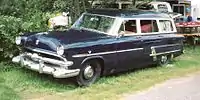 1953 Ford Customline Country Sedan
1953 Ford Customline Country Sedan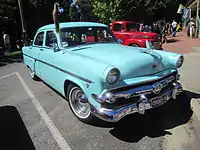 1954 Ford Customline “Fordor” Sedan
1954 Ford Customline “Fordor” Sedan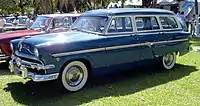 1954 Ford Customline Country Sedan
1954 Ford Customline Country Sedan
Second generation (1955–1956)
| Second generation: 1955 to 1956 | |
|---|---|
 1956 Ford Customline Victoria | |
| Overview | |
| Production | 1955-1956 |
| Body and chassis | |
| Class | Full-size |
| Body style | 2-door sedan[3] 4-door sedan[3] 2-door hardtop coupe[3] |
| Layout | FR layout |
1955
The 1955 Customline was redesigned with new longer, lower and wider bodies.[3] It continued as the mid range trim level, now positioned below the new Ford Fairlane and above the Ford Mainline.[3] It was offered in 2-door sedan and 4-door sedan body styles only,[3] with the wagons now included in their own series which comprised the Ford Ranch Wagon, Ford Country Sedan and Ford Country Squire.[3] Customlines were available with 223 cubic inches (3,650 cc) inline six-cylinder or 272 cubic inches (4,460 cc) V8 engines.[3] 1955 Customline production totaled 471,992 units.[3]
1956
The 1956 Customlines utilized the 1955 bodies with only minor changes.[3] A Customline Victoria 2-door hardtop was added to the range.[3] 1956 Customline production totaled 368,653 units, and was manufactured in several branch assembly plants the company had continued to operate in the United States.[1][3]
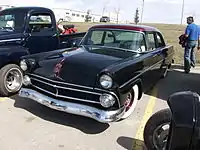 1955 Ford Customline Tudor Sedan
1955 Ford Customline Tudor Sedan.jpg.webp) 1955 Ford Customline Fordor Sedan
1955 Ford Customline Fordor Sedan 1956 Ford Customline Victoria
1956 Ford Customline Victoria
The Customline was not carried over to the 1957 model year.[6]
Australian production
The Customline was also produced by Ford Australia from 1952 to 1959.[2] Cars were assembled using Australian built bodies and imported chassis kits which included all front sheet metal.[7] In addition to the Customline sedan, a limited number of station wagons [8] and the Australian developed Mainline Coupe Utility were produced.[7]
The 1952 model was updated in 1953 and 1954 along the lines of the US Fords.[9] All were powered by the Flathead V8 which went into Australian production in 1952.[9] This included the 1954 model which was fitted with the older Chassis and engine rather than the new overhead valve Y-block V8 which had been introduced in the US for 1954. Australian 1954 Fords also used King Pin front suspension and still had 1952 rear Quarter Panels. >[bilsborow archives]
The 1955 body was used for four model series in Australia.[10] The 1955 model was powered by the overhead valve Y-block V8 which had entered partial Australian production with locally sourced components.[11] The 1956 model featured the 1956 US Customline grille, 12 volt electrics and a new Fordomatic automatic transmission option.[11] The 1957 model retained the 1956 body but featured a large V8 badge positioned in the grille and utilized 1956 Ford Fairlane trim.[9] The 1958 model used the 1955 Canadian Meteor grille with a four-pointed star and 1956 Meteor side trim.[9] The 1958 ‘star model’ was badged as either a Customline or as a Fordomatic [11][12] Production ended in September 1959 with the introduction of Australian assembled 1959 Fairlane 500, Custom 300 and Ranch Wagon models.[10] An estimated 18,000 examples of the 1955-1959 sedan were produced.[13]
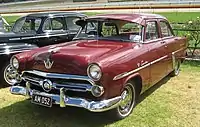 1952 Australian Ford V8 Customline
1952 Australian Ford V8 Customline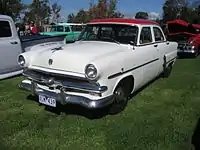 1953 Australian Ford V8 Customline
1953 Australian Ford V8 Customline.jpg.webp) 1954 Australian Ford V8 Customline
1954 Australian Ford V8 Customline_(8437648522).jpg.webp) 1955 Australian Ford V8 Customline
1955 Australian Ford V8 Customline.jpg.webp) 1956 Australian Ford V8 Customline
1956 Australian Ford V8 Customline_(8437649278).jpg.webp) 1957 Australian Ford V8 Customline
1957 Australian Ford V8 Customline.jpg.webp) 1958 Australian Ford V8 Customline with Fordomatic side trim
1958 Australian Ford V8 Customline with Fordomatic side trim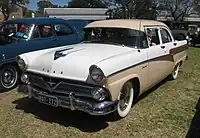 1958 Australian Ford V8 Fordomatic
1958 Australian Ford V8 Fordomatic
See also
References
- 1 2 Flory, Jr., J. "Kelly" (2008). American Cars, 1946–1959 Every Model Every Year. McFarland & Company, Inc., Publishers. ISBN 978-0-7864-3229-5.
- 1 2 1952-59 Ford Customline: Blue-Collar American becomes an Upper-Crust Aussie, www.shannons.com.au Retrieved on 8 November 2013
- 1 2 3 4 5 6 7 8 9 10 11 12 13 14 15 16 17 18 19 20 21 22 23 24 25 26 27 John Gunnell, Standard Catalog of American Cars 1946–1975, Revised 4th Edition, pages 389-397
- ↑ Ford 6 page sales brochure for 1952 Customline Country Sedan and Crestline Country Squire
- ↑ 1954 Ford brochure, www.oldcarbrochures.com Retrieved on 9 November 2013
- ↑ John Gunnell, Standard Catalog of American Cars 1946–1975, Revised 4th Edition, pages 397-399
- 1 2 Eddie Ford, The Australian OHV Ford Mainline Coupe Utility, Restored Cars #198, Jan-Feb 2010, pages 51-53
- ↑ Norm Darwin, The History of Ford in Australia, 1986, pages 137
- 1 2 3 4 Norm Darwin, The History of Ford in Australia, 1986, pages 126-131
- 1 2 The Australian 1959-60 Ford Fairlane, Restored Cars No. 84, pages 4-6
- 1 2 3 Aussie originals: Ford Customline, www.uniquecarsmag.com.au Retrieved on 11 November 2013
- ↑ Ford Motor Company of Australia advertisement for the 1958 Ford V8 Customline and Ford V8 Fordomatic, www.flickr.com Retrieved on 11 November 2013
- ↑ Ford Customline, www.motoring.com.au Retrieved on 11 November 2013